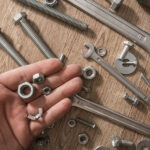The global industrial fasteners market was valued at US $89.43 billion in 2023 and is expected to reach $124.98 billion by 2029 — growing at a CAGR of 5.74%. This is according to a new report by Arizton Advisory and Intelligence, a quality-driven research firm.

Industrial Fasteners Market Report 2024-2029. For a sample of the report, click here.
The market’s growth is primarily influenced by factors, including:
- The overall expansion of the manufacturing and construction industries
- Technological advancements leading to innovative fastening solutions
- Demands for high-quality and durable fasteners across various applications
Additionally, global trends, such as the push for sustainability and energy efficiency, impact the development of eco-friendly and lightweight fasteners.
Key components of the industrial fasteners market include the production, distribution, and application of these fastening solutions. Manufacturers produce a wide array of fasteners to meet the specific needs of different industries, ranging from automotive and aerospace to construction and machinery manufacturing.
The components of industrial fasteners are crucial in several industries, providing a secure and reliable connection for different materials, structures, and machinery. They’re used in construction, manufacturing, automotive, aerospace, and many other sectors to ensure the structural integrity and functionality of assembled components.
Moreover, the industrial fasteners market is a critical component of the manufacturing and construction sectors, encompassing various tools and devices designed to securely join or affix different materials. Industrial fasteners include screws, nuts, bolts, washers, rivets, and other specialized components. These fasteners are pivotal in ensuring the structural integrity and reliability of assembled products and structures in various industries.
INSIGHTS
By material — The global industrial fasteners market can be broadly segmented based on materials into metallic and non-metallic categories. Metal fasteners, including steel, aluminum, and stainless-steel variants, dominate the market due to their strength, durability, and versatility across various industries. They’re widely used in construction, automotive, and manufacturing sectors.
The rise in custom fastener manufacturing, coupled with product penetration of specialty variants in the automotive industry, is expected to propel growth over the projected period.
Non-metal fasteners, such as those made from plastics, composites, or ceramics, are gaining traction, particularly in applications where corrosion resistance or weight reduction is crucial. Though the non-metal segment holds a lesser share, it’s expected to grow at a higher CAGR of over 6% in the global industrial fasteners market during the forecast period.
Industries such as electronics and aerospace often favor non-metallic fasteners because of the added advantage of lesser weight.
By product — The global fasteners market is diverse and segmented by product types, including screws, nuts, bolts, washers, and other components like rivets.
Screws, which play a critical role in holding materials together, are widely used across various industries and thus are the most common and crucial type of fasteners, thus holding the maximum segmental market. The industrial fasteners market encompasses a wide array of screw types, each tailored to specific needs. Common types include wood screws, machine screws, self-tapping screws, and self-drilling screws. Further, bolts, known for their robustness, also hold a significant industry share and find applications in structural and machinery assemblies.
Other fasteners, such as rivets, are also used for specific applications, especially in industries requiring a permanent and secure fastening solution. One of the primary applications of rivets is in the aerospace industry, where they are used to join lightweight materials and components, ensuring structural integrity.
By type — The industrial fasteners market by type is segmented into threaded, non-threaded, and specialty fasteners, each serving specific purposes across various industries. Threaded fasteners, such as screws, nuts, and bolts, play a pivotal role in construction, automotive, and manufacturing, providing robust and reliable connections and holding the most significant segmental share.
APAC stands out as a prominent driver of the threaded fasteners market, with countries like China, India, and Japan at the forefront. The region’s thriving manufacturing landscape, fueled by rapid industrialization, construction projects, and a burgeoning automotive sector, significantly contributes to the demand for threaded fasteners. Non-threaded fasteners, including rivets and pins, on the other hand, are widely used in aerospace, automotive, and electronics, offering secure and permanent fastening solutions.
Further, specialty fasteners cater to unique applications, with examples like expansion anchors, retaining rings, and weld screws designed for specific requirements in industries such as oil and gas, infrastructure, and machinery. This segmentation reflects the market’s adaptability to diverse industrial needs, where different fasteners are strategically employed for optimal performance and reliability.
By end-user — In the automotive sector, fasteners are integral for assembling vehicles, ensuring structural integrity and safety. The growth in the automotive sector is expected to demand the highest percentage of fasteners and thus holds the highest market share of over 28%.
The aerospace industry relies on precision fasteners for aircraft assembly, where lightweight and durable solutions are paramount and hold the second most significant industry share. In machinery, fasteners contribute to the construction and maintenance of equipment, facilitating efficient operation.
The construction sector uses a variety of fasteners for building structures, providing stability and strength. Consumer appliances, such as electronics and home goods, also rely on fasteners for assembly, ensuring product reliability.
Additionally, the furniture industry employs fasteners for constructing durable and functional pieces and is expected to grow at a CAGR of over 5%. This diverse range of end-user segments underscores industrial fasteners’ versatility and widespread applicability across various industries.
Volatility in material costs
Volatility in raw material prices poses a significant challenge to the growth of the industrial fasteners market by affecting production costs and overall market stability. Fluctuations in the prices of key materials such as steel, aluminum, and copper directly impact the manufacturing expenses of industrial fasteners. This volatility is particularly evident in regions with heavy reliance on metal production.
For instance, in countries like China, a significant player in global fastener manufacturing, variations in steel prices can disrupt cost structures and erode profit margins for manufacturers.
Additionally, in the U.S. and Europe, where the industrial fasteners market is substantial, unpredictable changes in raw material costs can hinder manufacturers’ ability to offer competitive pricing, impacting their competitiveness in the global market. The intricate link between raw material prices and industrial fastener production underscores the market’s vulnerability to the inherent unpredictability of material costs.
The construction industry
The growth trajectory of the global industrial fasteners market is closely tied to the flourishing construction industry worldwide. Across the globe, heightened construction activities drive the demand for various industrial fasteners.
In the U.S., a robust residential and commercial construction market and infrastructure investments propel the need for these essential components. Similarly, European countries like Germany and the United Kingdom, characterized by ongoing construction projects, further bolster the global demand for industrial fasteners. The symbiotic relationship between the construction industry and the industrial fasteners market underscores the pivotal role of construction in driving the market’s growth.
In China, a construction boom, marked by extensive infrastructure projects and urban development, fuels a substantial need for fasteners to support building structures. India’s construction sector is also burgeoning, with large-scale projects contributing to the surge in demand for industrial fasteners.
The competitive landscape
The global industrial fasteners market is marked by intense competition among key players striving to establish their foothold and gain a competitive edge. Major industry participants, such as Stanley & Decker, Illinois Tool Works, Hilti, and others, engage in strategies like mergers, acquisitions, and partnerships to expand their product portfolios and geographical reach.
Additionally, focusing on technological advancements and innovation in fastener design and materials is a key trend among competitors seeking differentiation. The industrial fasteners market also sees regional and local players catering to specific market segments. As industries increasingly demand customized and application-specific fasteners, the competitive landscape continues to evolve, prompting companies to adapt swiftly to changing industry dynamics and customer requirements.
To download the report, click here. It includes key profiles on the companies listed below…
- Stanley Black & Decker
- Hilti
- ITW
- Berkshire Hathaway
- Howmet Aerospace
- LISI
- NIFCO
- Fontana Gruppo
- 3M
- A&G Fasteners
- Agrati Group
- Aoyama Seisakusho
- APL
- ARaymond
- B&B Specialties
- Böllhoff Group
- Boltfast
- Bulten
- Caparo
- CBC Fasteners
- Deepak Fasteners
- EJOT
- Ever Hardware Industrial
- Federal Screw Works
- FUCHS Schraubenwerk
- Jinyi Industrial Co.
- KAMAX
- KOVA Fasteners
- MacLean-Fogg
- PennEngineering
- Tong Hwei Enterprise Co.
- Würth Industrie Service
- Virginia Fasteners
- Apex Fasteners
- C. & E. FEIN
- Hebei Tailian Fastener Manufacturing
- Bolt Motorcycle Hardware
- MID-CONTINENT STEEL AND WIRE
- Kerb-Konus-Vertriebs
- Snap-on
- Fasteners & Fittings
- Southern Fasteners & Supply
- Jet-Tek
- AMPG (Accurate Manufactured Products Group)









Tell Us What You Think!